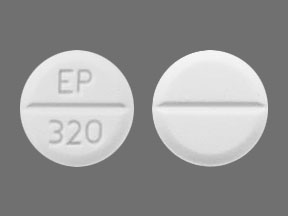
Pimozide Coupons & Savings Card – Discount Prices from $24.53
Pimozide is an oral antipsychotic medication specifically used to manage symptoms of Tourette syndrome when other treatments have failed. It is effective in reducing involuntary movements (motor tics) and vocal outbursts (vocal tics) by lowering the levels of dopamine, a natural substance in the brain. This reduction in dopamine activity helps alleviate the severity of tics. Pimozide is particularly recommended for severe cases where symptoms significantly impact daily life. It is important to note that Pimozide should not be used for mild symptoms. Adults typically take multiple doses throughout the day, while children 12 years and older are usually prescribed a single dose at bedtime. Common side effects may include sleepiness, drowsiness, and difficulty with muscle movement. Although the brand name Orap is not available, the generic form of the medication is accessible. Always consult with a healthcare professional for personalized medical advice and before starting any new medication.
Our coupons are free to use. Before paying, show the pharmacist your Pimozide savings card to get your free discount. Use our filters below to edit the prescription box to match your needs. The Pimozide prices will update based on your prescription needs. Above our Pimozide coupons, you can change your location to see pharmacy prices and costs in other areas. We're here to help you buy Pimozide at the lowest price with our prescription discount card.
My prescription
Edit
1MG, Pimozide (30 Tablets)
Select pharmacy

CVS
$42.64
COUPON PRICE
Walgreens
$24.53
COUPON PRICE
Walmart
$28.49
COUPON PRICE
Albertsons
$47.76
COUPON PRICEPimozide savings card
Show this card to your pharmacist
Walgreens
$24.53
BIN
ID
PCN
GRP
015995
LHKPY314067
GDC
DR33
Powered by
Pimozide is an oral antipsychotic medication specifically used to manage symptoms of Tourette syndrome when other treatments have failed. It is effective in reducing involuntary movements (motor tics) and vocal outbursts (vocal tics) by lowering the levels of dopamine, a natural substance in the brain. This reduction in dopamine activity helps alleviate the severity of tics. Pimozide is particularly recommended for severe cases where symptoms significantly impact daily life. It is important to note that Pimozide should not be used for mild symptoms. Adults typically take multiple doses throughout the day, while children 12 years and older are usually prescribed a single dose at bedtime. Common side effects may include sleepiness, drowsiness, and difficulty with muscle movement. Although the brand name Orap is not available, the generic form of the medication is accessible. Always consult with a healthcare professional for personalized medical advice and before starting any new medication.
Our coupons are free to use. Before paying, show the pharmacist your Pimozide savings card to get your free discount. Use our filters below to edit the prescription box to match your needs. The Pimozide prices will update based on your prescription needs. Above our Pimozide coupons, you can change your location to see pharmacy prices and costs in other areas. We're here to help you buy Pimozide at the lowest price with our prescription discount card.
More prescriptions for tourette syndrome
coupons from$21.46Save 76%
coupons from$21.24Save 73%
More prescriptions for tourette syndrome
Haldol Decanoate Save 76%coupons from $21.46
Haloperidol Save 73%coupons from $21.24
Pimozide dosage forms
Use our Pimozide 1MG coupon with prices from $28.49 for 30 Tablets. You can also use our Pimozide 1MG coupon with prices from $107.42 for 100 Tablets. We have a Pimozide 2MG coupon with prices from $83.57 for 60 Tablets. You can use our Pimozide 2MG coupon with prices from $135.08 for 100 Tablets.
Dosage Quantity Price from Per unit 1MG 30 Tablets $28.49 $0.95 1MG 100 Tablets $107.42 $1.07 2MG 60 Tablets $83.57 $1.39 2MG 100 Tablets $135.08 $1.35
| Dosage | Quantity | Price from | Per unit |
|---|---|---|---|
| 1MG | 30 Tablets | $28.49 | $0.95 |
| 1MG | 100 Tablets | $107.42 | $1.07 |
| 2MG | 60 Tablets | $83.57 | $1.39 |
| 2MG | 100 Tablets | $135.08 | $1.35 |
